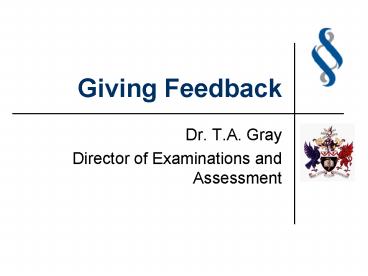Giving Feedback - PowerPoint PPT Presentation
1 / 11
Title:
Giving Feedback
Description:
2 the modification or control of a process or system. by its ... distortion or a whistling sound. Psychologists' view of feedback. Giving feedback why? ... – PowerPoint PPT presentation
Number of Views:66
Avg rating:3.0/5.0
Title: Giving Feedback
1
Giving Feedback
- Dr. T.A. Gray
- Director of Examinations and Assessment
2
What is Feedback
noun 1 information given in response to a
product, performance etc., used as a basis for
improvement. 2 the modification or control of a
process or system by its results or effects. 3
the return of a fraction of the output of an
amplifier, microphone, or other device to the
input, causing distortion or a whistling sound.
3
Psychologists view of feedback
4
Giving feedback why?
- Feedback is one of the most important ways in
which we learn - So feedback is one of the most important aspects
of teaching and relatively neglected in medical
education - Feedback is an essential component of workplace
based assessment which is intended to be
formative - It is emphasised quite rightly by PMETB
5
Giving feedback
- Why is feedback so powerful?
- It connects with feelings and goes to the core of
our being - When did you last get some good feedback how
did you feel afterwards? - Do you remember how you felt when someone was
really critical of your performance?
6
Giving feedback - skills
- The norm in medical education has been
destructive feedback (Sir Lancelot Spratt) - Praising is easy, makes people feel better but
needs to be constructive That was OK but is
not positive! - Skill requires
- detailed evaluation
- active listening
- constructive criticism
7
Feedback skills - active listening
- Non-verbal behaviour
- Focus on speakers experience of activity
- Acceptance (dont dismiss ideas)
- Empathy relate to their feelings
- Probing need to get to what is behind what is
said - Check and summarise
- Advise e.g. alternatives
8
Feedback skills - Constructive criticism
- Let the appraisee speak first
- Begin with the good points
- Plan a solution for each problem
- Be sensitive to person
- Show interest use your experience to coach and
counsel not score points - Be constructive and encourage appraisee to
participate in finding solution
9
Feedback skills - Constructive criticism
- Deal with one point at a time
- Criticise the act (deal with facts) not the
individual - Do not hyperbolise
- Dont joke it can be taken the wrong way
- Dont compare with other people
- Be productive, the aim is to improve performance
10
A simple framework for feedback
- Acknowledges role of feelings
- Starts with description before moving on to
evaluation and action planning - Person receiving feedback has opportunity to
speak first at each stage - Positive aspects are considered before negative
ones - Plans are made for future action and support
offered
11
Giving feedback a simple checklist
- Feelings what feelings does the learner have
(how do you feel it went?) - Description facts, facts, facts!
- Positive evaluation what went well?
- Negative evaluation what didnt go so well
(went wrong!) - Action planning and support
- Feedback on the feedback
- Loose ends anything left hanging in the air?

